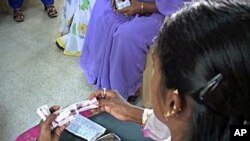"No condoms. No sex" has become a mantra for around 4,500 sex workers operating near India's southern city of Bangalore. With an estimated 2.5 million Indians infected with HIV, these prostitutes are on the frontline of India's battle against HIV and AIDS.
Parvati is one of 85,000 prostitutes working in India's Southeast State of Karnataka.
The young mother earns $2 U.S. for each sexual act. Her monthly income averages around $300. That's much more than the $60 U.S. a month she earned working long hours as a garment worker.
Just three months on the job, Parvati mistakenly applies eye-shadow to her lips. An older sex worker chides her for the make-up blunder.
"My husband left me. I joined the business to look after the family. In this business I am exploited. I did not know about condoms. So I just had sex without condoms," Parvati said.
Parvati was taught about condoms one month ago when another sex worker brought her to the community center in greater Bangalore. She is now one of the 4,500 sex workers who live by the slogan "No Condom, No Sex."
This is the catch-phrase for the government subsidized Bhoruka Charitable Trust. The organization began five years ago and has since had a 600 percent increase in the number of sex workers who have pledged to enforce the condom rule.
At the center, some of the sex workers peer educators. They are paid $30 U.S. a month to run safe sex workshops for other prostitutes.
They get regular medical check-ups. The center distributes 50,000 free condoms a month to the prostitutes. Many of their clients are construction workers and truckers who are at high-risk of infection.
Because an estimated 15 percent of female prostitutes in Southern India are HIV-infected, the sex workers are praised for their efforts to combat HIV and AIDS.
The "No Condom, No Sex" model seems to be working. Reports say condom use among these women is on the rise and the number of sexually transmitted infections has gone down.
Not all sex workers have the opportunity that Parvati has had to learn safe sex practices.
Peer educator Jaya Srinivashan has been a sex worker for the past 25 years. The single mother got infected with HIV from her husband who died in 2000. She wasn't tested until five years after his death. During that time she did not use condoms and believes she may have spread the virus to hundreds of people. She keeps her sickness a secret in fear she will lose her job.
"It is very difficult to explain to them that I am [HIV]positive," Srinivashan said. "I know that I am positive, but the client doesn't know. Suppose he gets HIV. Then, I feel very sad."
Now Srinivashan says she demands her clients wear a condom, but that 10 percent of clients refuse.
Parvati confirms that it has not been easy to stick to the "No Condom, No Sex" policy.
"I try to convince them to use a condom. Then I tell them that I have two children and I don't have a husband, so it is very important for me to be healthy. But even then it is difficult for me to convince them," she said.
Despite the challenges, Parvati says she feels more in control of her body now when she refuses to have sex without a condom. Critical, she says, in helping her face the difficult night and years to come.





